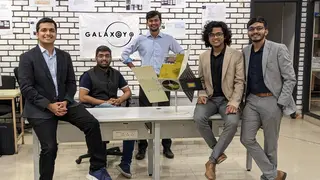A host of direct-to-consumer (D2C) brands are striding into the country’s footwear market with newer, niche product categories that blend global trends with vibrant design aesthetics while staying rooted to local cultural identities.
So you have the sneaker brand Comet, for instance, with mango-themed designs, and Banjaaran Studio’s ‘Patola’ featuring the heritage hand-woven textile from Gujarat and ‘Bageecha’ featuring chintz fabric harking back to 15th-century Golconda (in present-day Hyderabad).
Solethreads, Neemans and Gully Labs are the other names that are disrupting the footwear market with design elements that resonate across diverse demographics. “Being close to the market gives these brands a distinct advantage (over global brands),” says Abhishek Ganguly, co-founder and CEO of sportswear and athleisure company Agilitas. “Copying global business models does not guarantee success at scale. To thrive here, brands need an India-centric operating strategy... connecting with people’s emotions,” he explains.
The $10-billion Indian footwear market is projected to achieve a compound annual growth rate (CAGR) of 10-12 per cent over the next five years, says Dhruv Kapoor, partner at venture capital firm Anicut Capital, which has funded Neemans. Consumer preference for sustainable, design-led products is fuelling the growth of this nascent sector, which has raised $110.98 million over the past five years. Funding peaked in 2022 at $55.74 million, according to market intelligence platform Tracxn.
Innovating Leg-first
The footwear industry has traditionally seen limited disruption, observes Sumant Kakaria, CEO and co-founder of Solethreads. But that is changing as consumers move away from formal styles to relaxed, casual designs.
“These (startup) brands are innovating to create versatile footwear that suits both professional and casual settings, and address the shortcomings in inexpensive options,” he adds.

Sneaker from Solethreads
Utkarsh Gupta, co-founder of Comet, stresses on another area of disruption — the mismatch between existing designs and Indian consumer needs.
“Shoes sold in India often lack consideration for local preferences,” he observes.
Neemans, founded in 2017, has diversified its portfolio beyond sneakers to include slip-ons, flats, loafers, and sandals, priced between ₹1,500 and ₹2,000.
Taranjeet Singh Chhabra, founder and CEO, says the company’s omni-channel strategy played a major role in enhancing brand recall.
Neemans operates 14 exclusive stores across Bengaluru, Mumbai, Hyderabad, Kochi and Thiruvananthapuram. It plans six more outlets by the end of this fiscal year. Chhabra says the brand is seeing growing buying interest from tier-2 cities, too, thanks to word-of-mouth recommendations.
Kakaria wants to expand Solethreads’ presence both in-store and online.
“Currently, marketplaces account for 40-45 per cent of Solethreads’ sales while physical stores, still in early stages, contribute 7-8 per cent. We aim to grow this to around 15 per cent within six months,” he says.
Backed by investors like Nexus and Elevation, Comet plans to expand its offline presence by opening one store each in Bengaluru, Delhi and Mumbai by the middle of next year.
Instagrammable heft
In addition to a strong online presence and retail footprint, footwear start-ups have invested heavily in brand promotions on social media platforms to reach specific groups of buyers.
“Roughly 50 per cent of our target audience comprises Gen-Zs while we also have a significant number of millennial buyers, who value comfort,” says Comet’s Gupta. “They appreciate the unique stories our designs bring to everyday wear.”
Gen-Z gravitates towards Comet’s colour schemes and limited-edition drops, he says. “They’re drawn to the dynamic designs, making them a key audience for our more expressive collections,” he adds.
Neemans’ Chhabra also banks on differentiation for added visibility. On social media, the company encourages customers to share ‘video stories’ of their engagement with the brand. “When customers share the stories behind our shoes, it amplifies brand awareness,” Chhabra says.
While differentiation comes with a cost, the start-ups attempt to balance pricing to cater to India’s value-conscious market. “We price our products at ₹4,000 because the Indian market seeks value for money. Consumers are willing to upscale and premiumise their purchases when they perceive genuine value,” Gupta says.
Funding challenges
Any category disruption comes with its own set of challenges, notes Solethread’s Kakaria. The initial hurdles often include establishing brand positioning in a crowded market.
Concurring with this view, Comet’s Gupta adds that the noise created by the bigger brands makes it all the more difficult for the newbie players. “The presence of larger brands adds a lot of clutter, making it challenging to stand out,” he says.
However, the biggest challenge, according to him, lies in the product itself. “Shoes are extremely technical,” he explains. “It’s not just about building and developing the product but ensuring its quality and scaling up the manufacturing process over time.”
Despite the challenges, VCs are optimistic about growth in this segment, says Kapoor. “The challenger brands are leveraging an omni-channel strategy, powered by digital marketing, to scale up and reach customers across various touchpoints. This contrasts with how legacy brands scaled up — largely through an offline store-led or distribution-led model. The segment is witnessing a paradigm shift from open to closed footwear and VC investors are betting that the new-age brands will be better positioned to capture it,” he says.







Comments
Comments have to be in English, and in full sentences. They cannot be abusive or personal. Please abide by our community guidelines for posting your comments.
We have migrated to a new commenting platform. If you are already a registered user of TheHindu Businessline and logged in, you may continue to engage with our articles. If you do not have an account please register and login to post comments. Users can access their older comments by logging into their accounts on Vuukle.